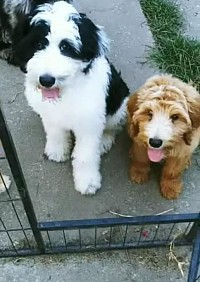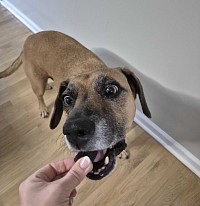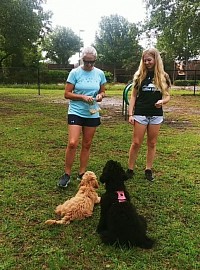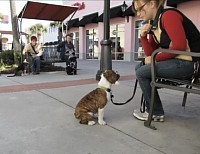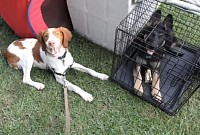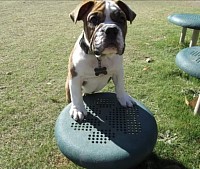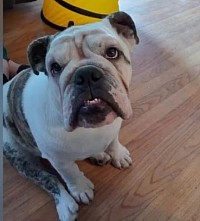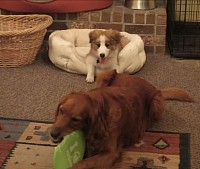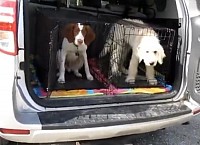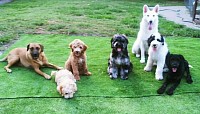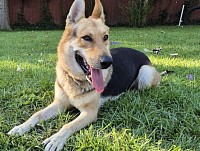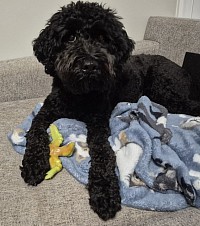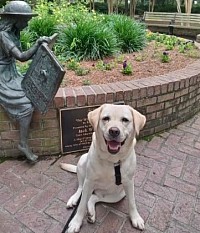Frequently Asked Questions
Do I need to use treats to train my puppy?
Successful puppy training requires a high rate of reinforcement. Food rewards with marker training is the fastest and most reliable way to train most puppies. Food rewards can be phased out during the training process as your puppy matures.
Is Puppy Camp right for my puppy?
If you're not sure, schedule a free consultation with us. Our trainer will discuss your concerns with you and evaluate your puppy. Most puppies do well at camp. Highly anxious puppies may benefit from learning at home with private lessons.
What is my puppy's daily schedule?
Each day is slightly different. This is our general routine.
First potty break is at 6am, followed by off leash training, breakfast, and indoor training. 11am is nap/rest time. All puppies are crated with a frozen Kong and peaceful music and/or socialization sounds. 1:30pm is another potty break and playtime followed by indoor training and relaxation time (not crated). At 5pm, we take another potty break and have outside playtime. At 6pm, we go for walks and practice leash training. 8pm is dinner and indoor training. 10pm is the last potty break and in crates for bedtime by 10:30pm. A 2am potty break will be given if needed.
What do I send with my puppy to camp?
- Blanket, towel, bed or mat that smells like home.
- Food (please send enough to last for the duration of your puppy's stay)
- Collar with tags. Harness if you have one.
We provide treats, toys, crates, bowls, etc.
My puppy hasn't completed their vaccines yet, should I wait to start training?
Your puppy needs to have two rounds of vaccines to start camp. This puts most puppies around 10 to 12 weeks. Your puppy does not need their third round or rabies before beginning training, usually given at 14 to 16 weeks. From a behavioral perspective, it is best to begin training sooner if your puppy is healthy.
My puppy is due for vaccines during training.
Ask your veterinarian if it's okay to schedule your puppy's vaccines for before or after their camp time. If that isn't possible, we prefer to bring the puppy to the vet for their visit. This allows us to use the vet visit as a training field trip. If you prefer to be with your puppy, we will meet you at the vet or arrange a time for you to pick them up from our home before their appointment.
Why can't I see my puppy during camp?
A visit with you will be a very exciting event for your puppy and likely confusing and stressful when you leave them after a short amount of time, making it challenging to relax or focus on training. We understand it's difficult to leave your puppy and provide frequent updates with pictures.
Why is it best for a trainer to transport my puppy?
When dropping your puppy off for training, ideally your trainer will pick them up. This is mostly to avoid your puppy seeing you leave and stressing about finding you. When your trainer picks up your puppy, it allows them to explore their new environment with less stress. We will be there to guide them every step of the way! Puppies are crated or use a seatbelt with a harness when riding in the car.
Do you guarantee your training?
There is no guarantee of a specific training outcome. Every puppy is an individual and we tailor training to them. Behavior is constantly changing and adapting, especially as puppies grow, therefore you must follow your training guide and complete your included private lessons to maintain and build upon results.
Why do older puppies have longer training camps?
A puppy's critical socialization period ends around 14 to 16 weeks old. Past this age, puppies are starting to enter adolescence. Habits may take a little longer to build and socialization can be more sensitive.
What if my puppy is injured while at camp?
Our trainer is responsible for responding immediately, notifying you, and using their judgement and/or communication with you to decide whether to bring the dog to your vet, urgent care or emergency hospital or continue to monitor at our trainer's home. You are responsible for veterinary fees incurred for your puppy while they are at camp.
